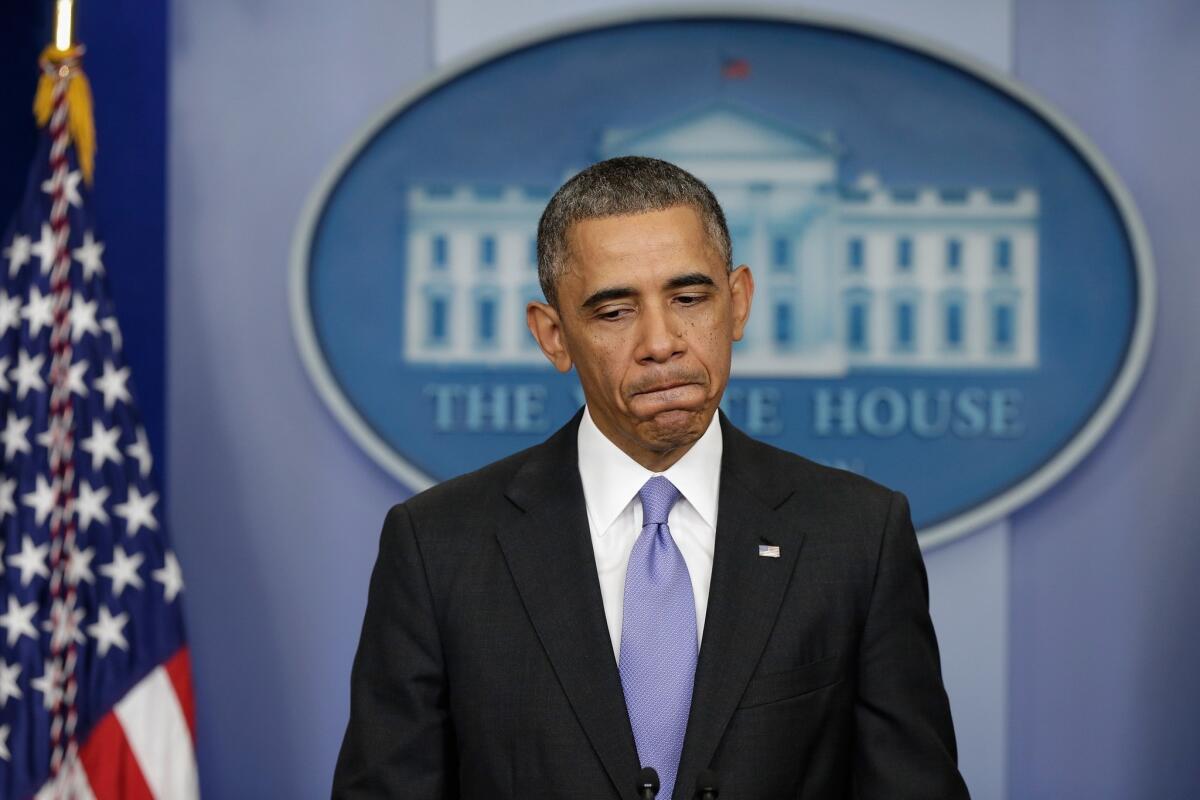The L.A. Times editorial board’s lonely defense of Obamacare

- Share via
Here’s something you don’t see every day: the Los Angeles Times editorial board parting company with President Obama on Obamacare.
OK, so I’m exaggerating. The Times’ board criticized several aspects of the 2010 Patient Protection and Affordable Care Act as it worked its way through Congress, particularly on the cost-containment front. Nevertheless, because the board supported the law’s passage and embraced many of its specific reforms, some right-of-center readers accused The Times’ “looney left” editorial writers of acting as cheerleaders for the president.
On Friday, though, the distance between the board and Obama on healthcare was made abundantly clear. The board blasted Obama for backing away from one of the law’s central reforms: a set of new standards for health plans that aimed to make the market for individual policies function more like the one for large groups, with costs and risks spread broadly across all consumers.
PHOTO ESSAY: Obamacare -- and 8 other bungled launches
Obama was one of many Democrats retreating from the new standards. On Friday, 39 House Democrats joined 222 Republicans in voting for a bill that would let insurers ignore the new standards for a year and continue to offer any policy they had in effect in 2013. That measure passed after Republicans had defeated a less-sweeping Democratic alternative that would have allowed insurers just to renew the noncompliant policies held by current customers. The latter attracted the support of 187 Democrats; only two Democrats opposed both measures.
The retreat was prompted by insurers notifying millions of consumers that their policies were being canceled because they did not comply with the law’s new standards. Never mind that a relatively small percentage of the U.S. population has individual insurance policies, as opposed to being on group plans issued by their employers or the government (e.g., Medicare). The cancellations outraged the public because Obama had assured people that if they liked their health plan, they could keep it.
The Times’ board, however, is sticking to its position even as the room empties around it. As it argued Thursday in a editorial urging Obama not to backtrack, the reforms in the individual insurance market were designed to end plans that “effectively segregated younger, healthier people from those with potentially expensive healthcare needs — for example, by excluding coverage for maternity care or schizophrenia.”
“Such changes invariably produce winners and losers in the short term in the hope of better results for everyone in the long term,” the board continued. “News accounts have been filled lately with laments from healthy people whose low-cost policies have been canceled; they complain the government is forcing them to subsidize older, sicker Americans. But they’ll almost certainly be on the other side of the equation at some point, because there’s no guarantee against illness and injury.”
Granted, those policy abstractions provide little comfort to those who are being forced to trade policies they liked for ones that are considerably more expensive. Many of those consumers were well served by the pre-Obamacare system, which favored the young and healthy at the expense of everyone else. And it’s probably a small consolation to know that there’s a broad financial -hardship exemption from the requirement to buy insurance -- the exemption extends to anyone who’d have to pay more than 8% of his or her income to obtain coverage. Given the choice between having coverage they could afford and going uninsured but not penalized, rational people would opt for the former.
But The Times’ board argues that it would be better for lawmakers to focus on the affordability problems than to simply preserve for another year (or more) the status quo in the individual market. Simply telling states that it would be OK for insurers to renew noncompliant policies, as the administration did Thursday, or suspending the standards for a year, as the House voted to do Friday, won’t necessarily raise any of the canceled policies from the dead. Insurers say it’s too late in the year to be reinstituting coverage for 2014. And even if insurers do revive their canceled plans, there’s no guarantee they won’t raise premiums -- something they’ve done in that market year after year.
It’s possible that this whole mess could have been avoided had Obama told the public, early and often, that the only way they could keep the policy they had before the healthcare law was passed was if they kept renewing it without change. He didn’t do so, which is why he finds himself in full retreat today. But we’re not joining him.
ALSO:
There goes immigration reform, again
Obamacare: The president delivers more false hope
Follow Jon Healey on Twitter @jcahealey and Google+
More to Read
A cure for the common opinion
Get thought-provoking perspectives with our weekly newsletter.
You may occasionally receive promotional content from the Los Angeles Times.







